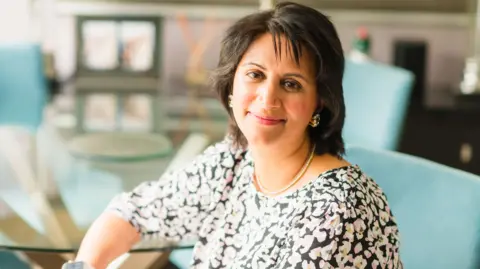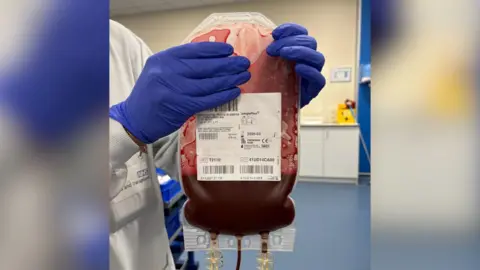Mother given 'lifeline' after made-to-order blood transfusion
 NHS Blood and Transplant/Caters Photographic/PA Wire
NHS Blood and Transplant/Caters Photographic/PA WireA woman whose world came "crashing down" after she was diagnosed with leukaemia says she was given a lifeline when she received a blood donation that acted like a "fake immune system".
Fahreen Virani, 42, from north-east London, was diagnosed with acute myeloid leukaemia in February 2024 after noticing symptoms of tiredness, backache and low haemoglobin counts.
After chemotherapy, the dentist from Waltham Forest needed a stem cell transplant, but contracted pneumonia which was not responding to usual treatments.
As a result, Mrs Virani was told she needed a special "before midnight" transplant of components taken from blood.
"I was terrified. I had a boy who was going to turn four two days later," she said.
"We had a young family, we had just moved house, and everything came crashing down."
Ms Virani had chemotherapy so her body would accept a stem cell transplant, however, the chemotherapy also prevented her bone marrow from making enough white blood cells, making her vulnerable to the fungal pneumonia.
"The doctors said that when someone has a stem cell transplant there's a 10% chance it will result in death but with the fungal pneumonia it was 30%," Ms Virani said.
"They treated me with antifungals but that didn't fully work, so that's why they started the granulocytes – it would give me a fake immune system."
 NHS Blood and Transplant/Caters Photographic/PA Wire
NHS Blood and Transplant/Caters Photographic/PA WireGranulocytes are white blood cells which attack and break down bacteria, fungi and viruses but they have a short shelf life and have to be given to a recipient before midnight on the day after donation.
Each granulocytes transfusion is made for a single patient and a standard transfusion consists of two packs, with each one made from 10 blood donations. They have to be quickly tested and processed before being rushed to hospital.
Ms Virani said: "I remember waking up early every day thinking, 'Are they here? Are they here?'
"If you go past midnight, they have to dispose of them, they expire - that's why I was always so eager.
"They drastically helped me to be ready for the transplant. They were a lifeline."
As a result of the treatment, Ms Virani received her stem cell transplant last July.
"I can walk my son to school every day," she said. "We can go to Hyde Park and hire a bike. A few months ago, I never dreamed I would be able to do that.
"The donors whose blood was used for the granulocytes are in my prayers every night. I am so immensely grateful. I don't know where I would be without them."
More donors needed
Fewer than 2,000 packs of granulocytes are sent to hospitals each year, NHS Blood and Transplant said.
A spokesperson added they were low on blood stocks in England and raised concerns over a dip in donors over the summer.
Gerry Gogarty, from NHS Blood and Transplant, said: "Your blood contains all kinds of components such as red blood cells, plasma, platelets, and white blood cells, which can all be separated out to save or improve several lives.
"So as well helping people with your red cells, the same donation could give someone like Fahreen a potentially lifesaving immune system boost.
"But to keep supplying hospitals this summer we need more donors.
"We hope Fahreen's story shows the unusual and unexpected ways that blood is so vital to the wider NHS."
Listen to the best of BBC Radio London on Sounds and follow BBC London on Facebook, X and Instagram. Send your story ideas to [email protected]
